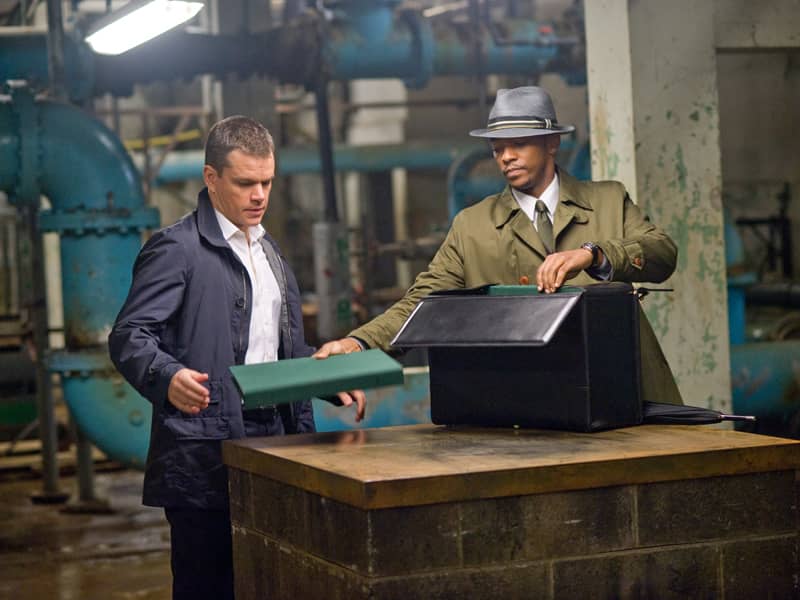
PHOTOGRAPH: ANDREW SCHWARTZ / UNIVERSAL
Anthony Mackie is a happy man. “I’m happy as hell,” he says, as if his mile-wide grin and infectious laugh didn’t make that clear the moment he walked into the room. “I know a lot of people,” he continues, “and I would venture to say only three of them are truly happy. I’m one of the three.”
Mackie’s happiness certainly doesn’t stem from the roles he typically embraces. Rather than the expected comedies, his filmography is full of serious, thoughtful fare such as “The Manchurian Candidate,” “Million Dollar Baby,” and “8 Mile.” The film that arguably put him on the map, last year’s Best Picture winner “The Hurt Locker,” is a grim, razor-tense war flick about a bomb disposal unit in Iraq. ‘Serious’ and ‘grim,’ however, are not adjectives I would apply to the man sitting in front of me: he’s making wisecracks before we’ve even started the Q&A and I’m concerned, only half-jokingly, that his chair will be unable to contain him.

PHOTOGRAPH: ANDREW SCHWARTZ / UNIVERSAL
The film we’re here to discuss, “The Adjustment Bureau,” is yet another entry in Mackie’s serious and thoughtful acting resume. The film is a romantic thriller about presidential hopeful David Norris (played by Matt Damon), the woman he loves, and the shadowy Adjustment Bureau who are determined to keep them apart. Mackie plays Harry Mitchell, a Bureau agent assigned to David’s case who must answer to the Chairman, a mysterious figure who controls events from behind the scenes. The film heavily implies that the Chairman and Bureau agents are stand-ins for God and angels respectively, although Mackie dismisses that interpretation. “I think if we put the title of God on the Chairman,” he says, “we lose the idea of what the film is trying to say…we lose the point of our free will…I’m from the South and I’m a firm believer in family. I feel like every person on this earth, their fate is dictated by the way their parents raised them. I believe that. I would not be here sitting in this seat right now if my mom didn’t punch me in the face everyday.” Although Mackie says this last bit with a laugh, there’s an honesty to the statement that indicates he received his fair share of smacks to the head. “I think when you look at the Chairman and the idea of who the Chairman is, the Chairman is [different for] each one of us individually…for me, the Chairman is my mom because she will punch me in the face.”
Mackie’s mother was obviously a powerful force, both in her life and death. She passed away when he was 16, prompting him to strike out on his own. “I literally just packed up my little Nissan Sentra and saved up all my money for two years and went to boarding school and like a thief in the night, like the Baltimore Colts, I just left…I realized it was about time, in order to become a man, sometimes you got to strike out on your own and fall sometimes.” Boarding school led to Juilliard, and Juilliard led to trouble. “I almost got kicked out of Juilliard, [but] my brother came up from New Orleans and stayed for a weekend and begged my teachers to keep me. ‘Don’t kick him out!’ And he told me, ‘I had to beg these people to keep you. So if you don’t do right, I’m going to take you home and you’re going to work on a roof for the rest of your life.’” The threat of death by shingle-laying was apparently enough: Mackie graduated and quickly landed his first prominent film role in “8 Mile.” “Every time I get off track…my two brothers are the two that kind of put me back on track. So, they are like my Bureau members,” he says, bringing the analogy full circle.

PHOTOGRAPH: ANDREW SCHWARTZ / UNIVERSAL
None of this provides the answer to his self-proclaimed happiness. In fact, his life appears to be one marked by tragedy, hard work, and sacrifice, things that often lead to fulfillment but not necessarily happiness. Mackie nods at the mention of sacrifice. “My life has been a bucket of sacrifice,” he says, as if that answered the question of happiness. It doesn’t, of course, so he launches into story mode. “A friend of mine just graduated from law school, $230,000 in debt, and she’s been working at this firm for two years and she hates it, but she can’t quit her job because she has to pay her student loans. She’s making a bucket of money but she’s not happy.” That still doesn’t answer the question. Mackie smiles and continues: “I don’t know if you know who Bill Withers is,” he begins. I don’t, my music vocabulary being woefully inadequate, but Mackie helpfully fills in the blanks. “Bill Withers was this amazing R&B blues singer in the 60s and 70s, songs like ‘Lean on Me, ‘Use Me,’ and ‘Ain’t No Sunshine.’ At the height of his career, Bill Withers walked away from music because he said, ‘You know what? This isn’t real. This doesn’t make me happy.’ So he moved to the bay and started making furniture and you know what? He’s happy and I think that’s where sacrifice for happiness comes into play.”
Making the brave decision to walk away from everything to pursue your own happiness is both difficult and risky, but the benefits can be life changing. The characters in “The Adjustment Bureau” make that choice, and so did Mackie when he was 16. As to whether or not it was worth it, the talented young actor with his entire career in front of him just grins: “I’m happy as hell.”

